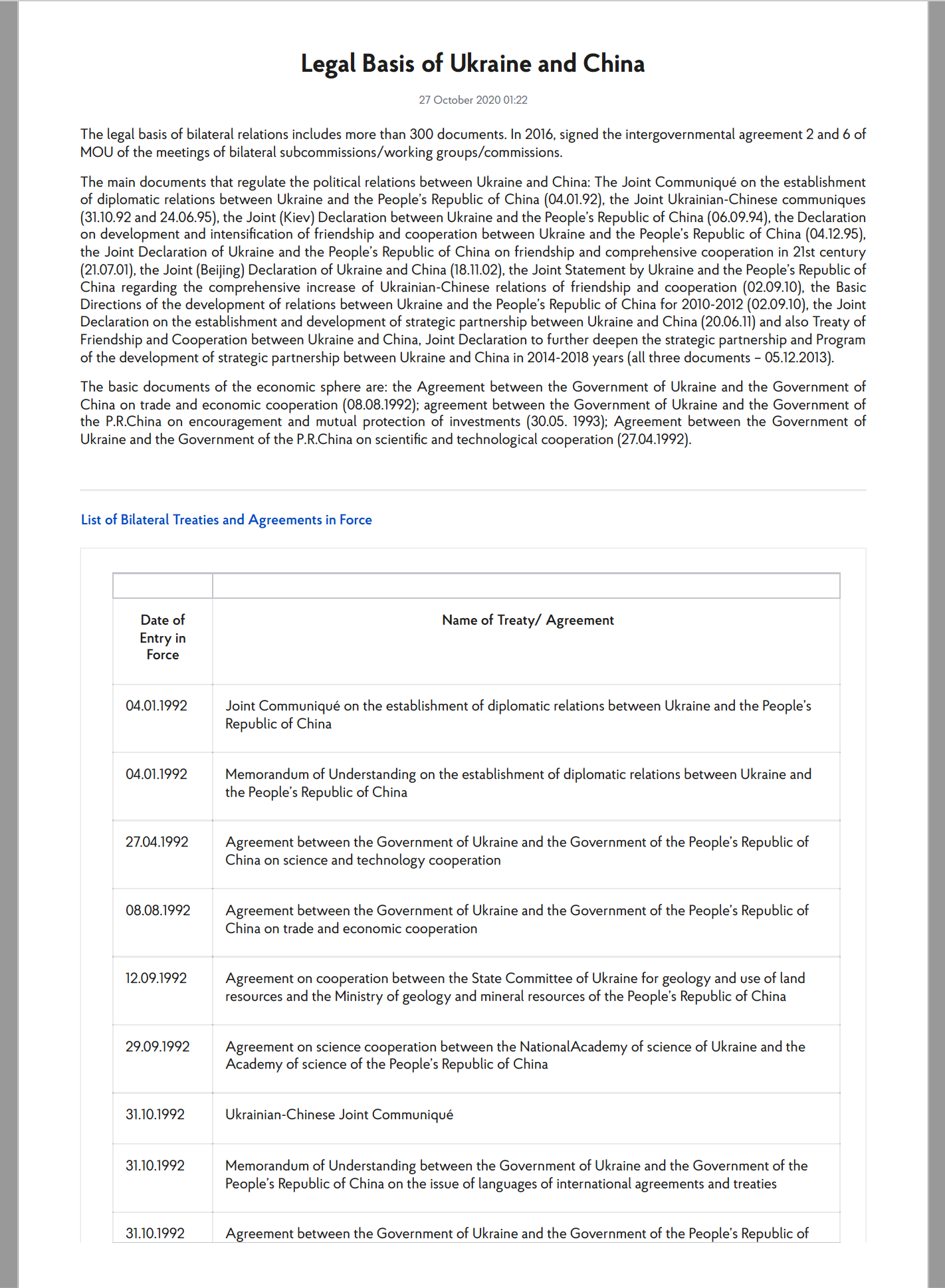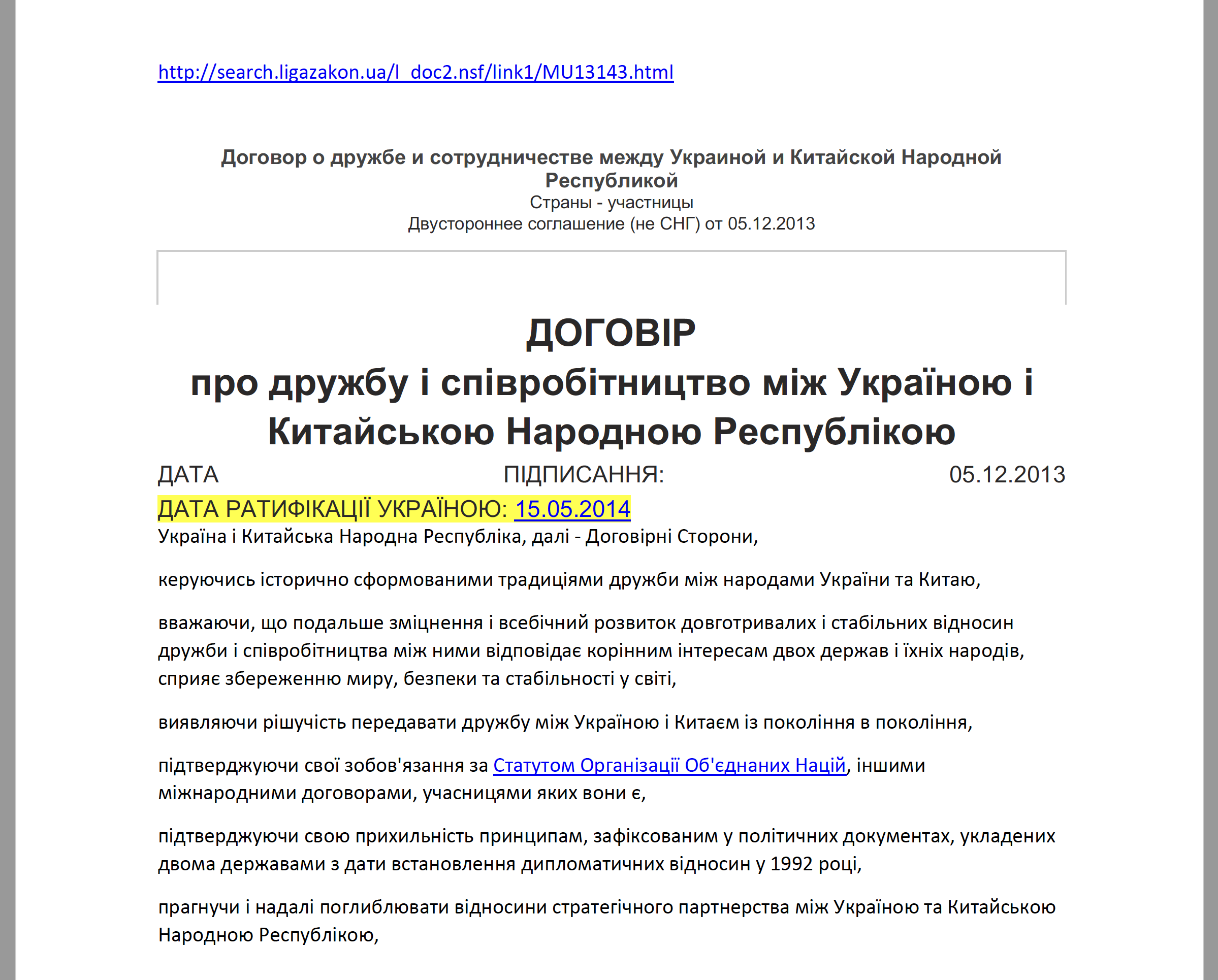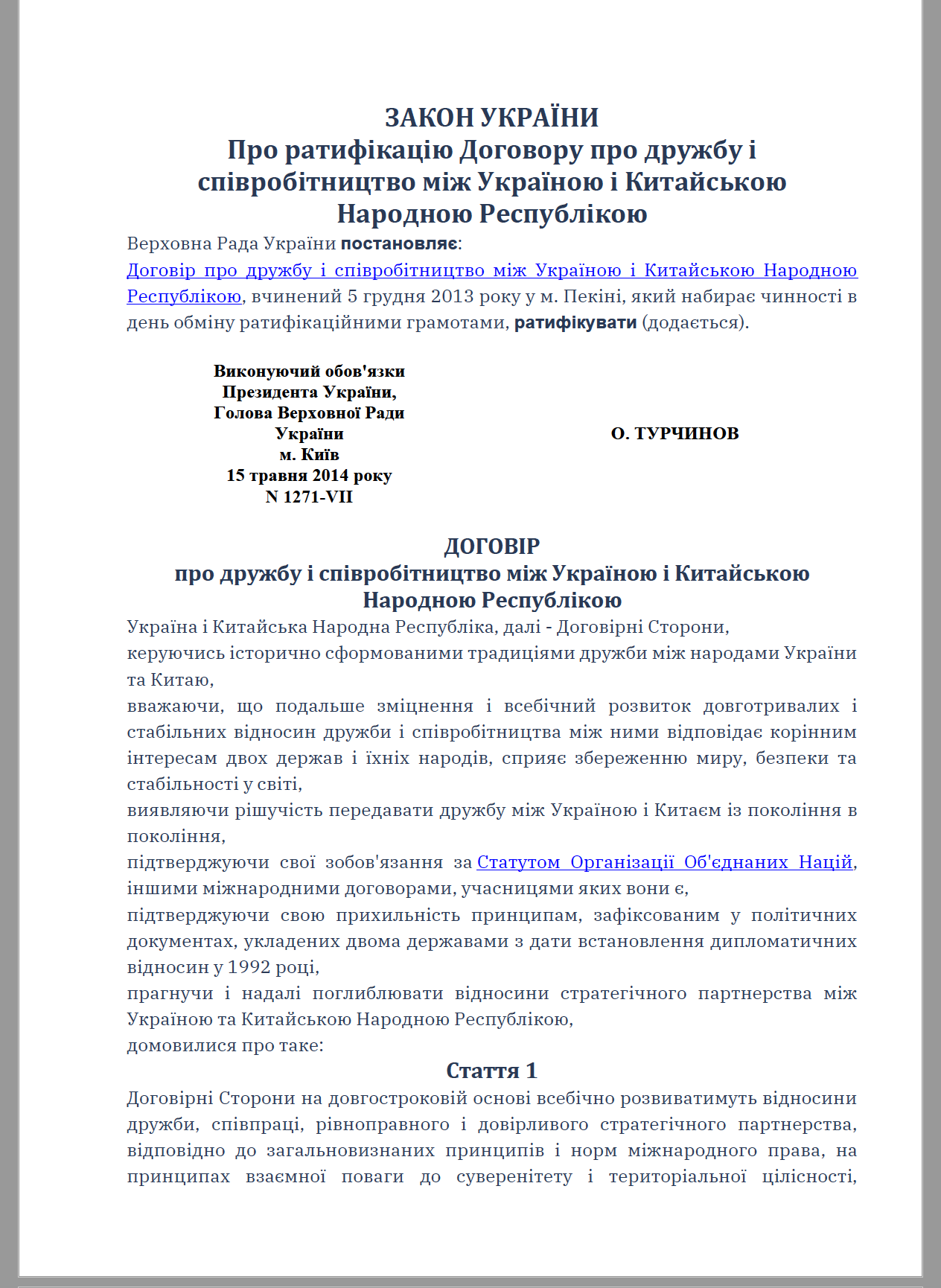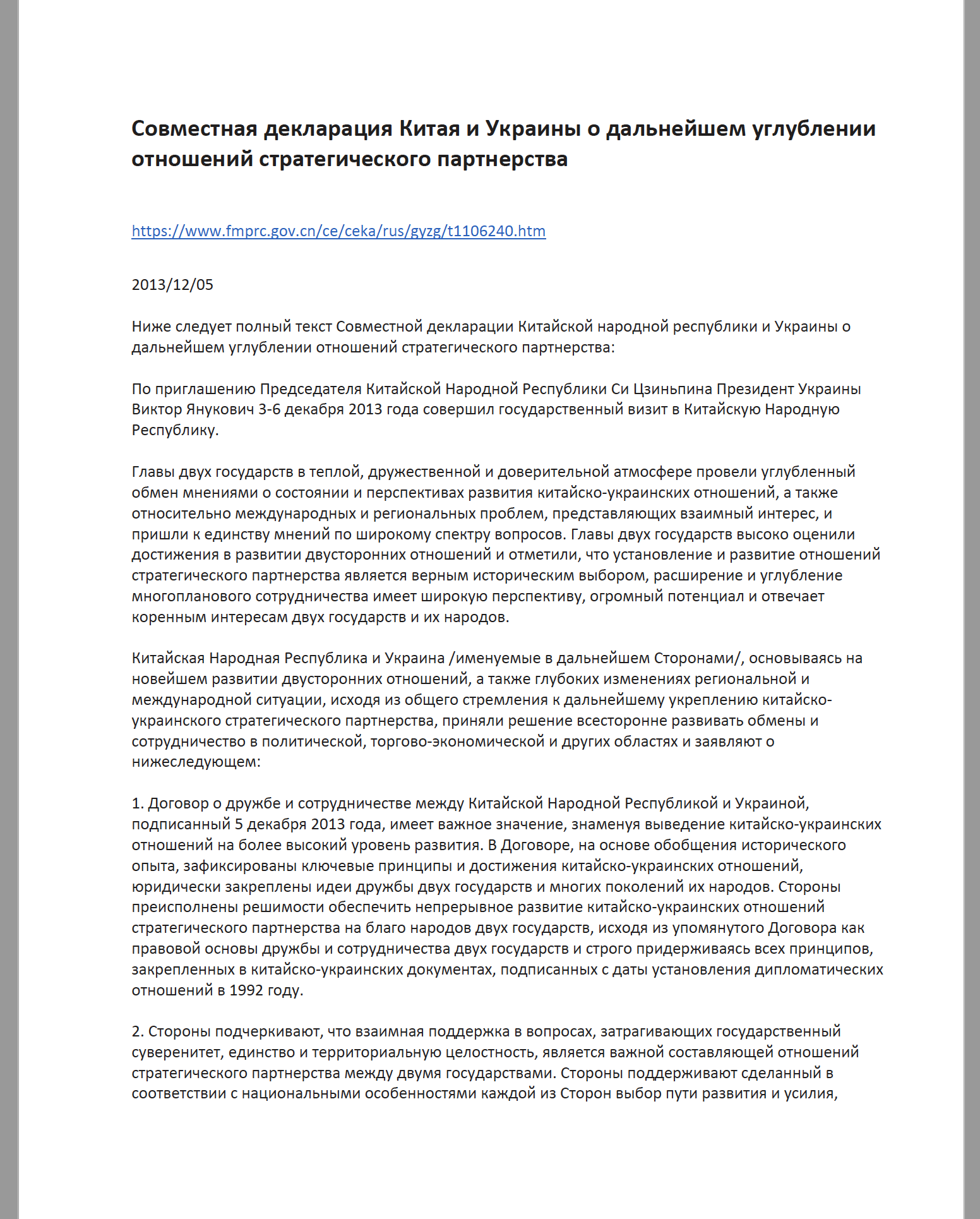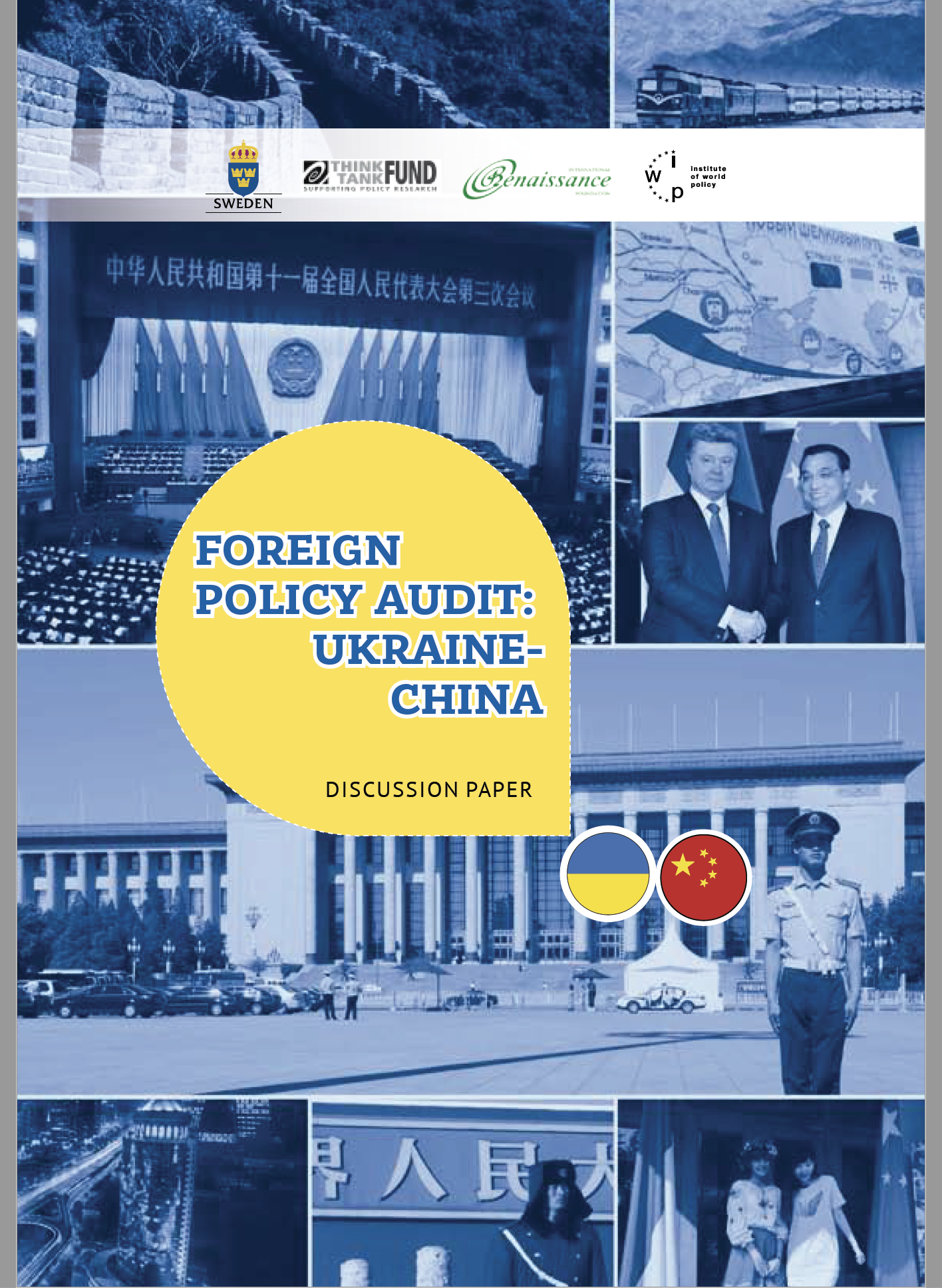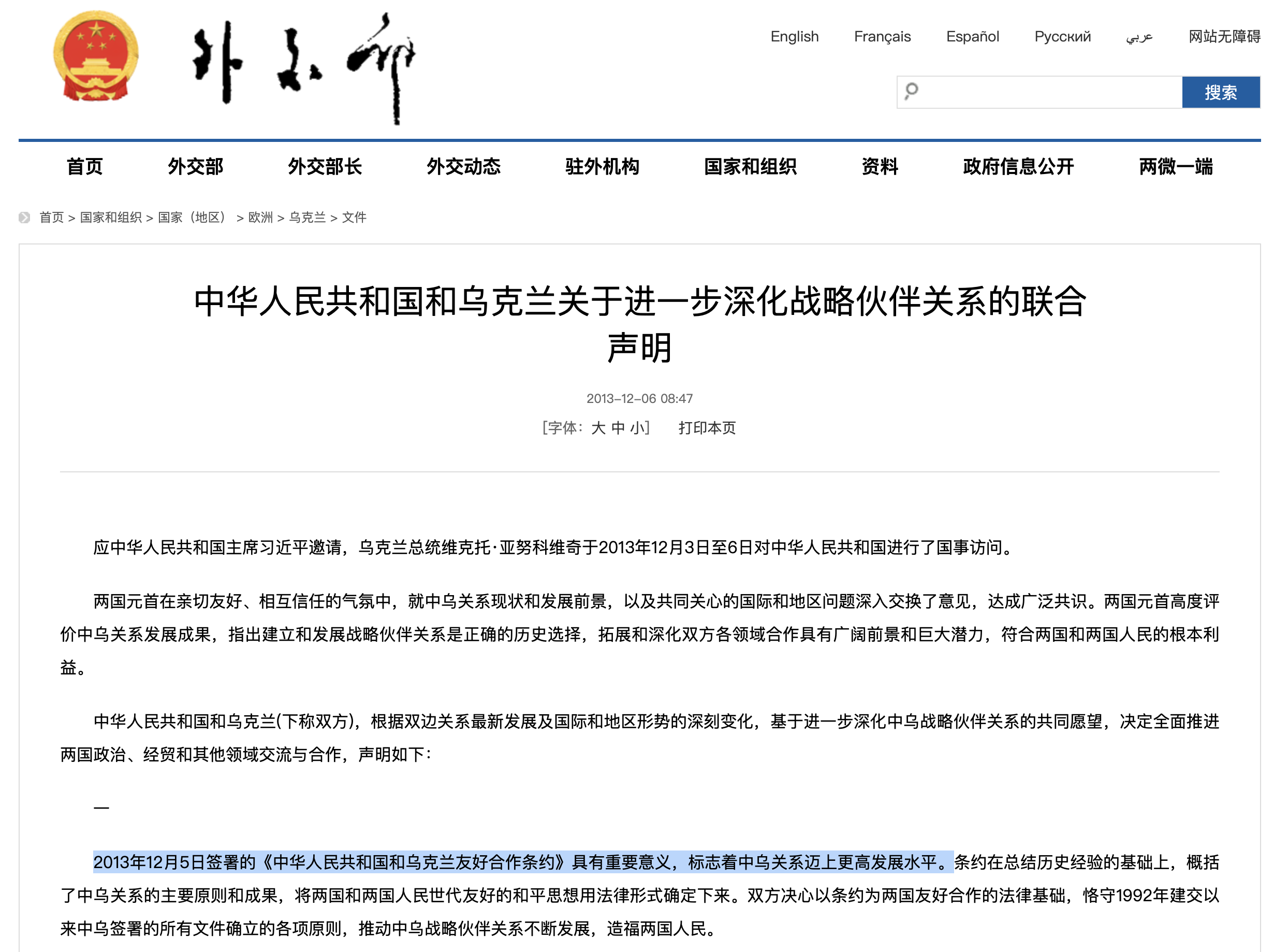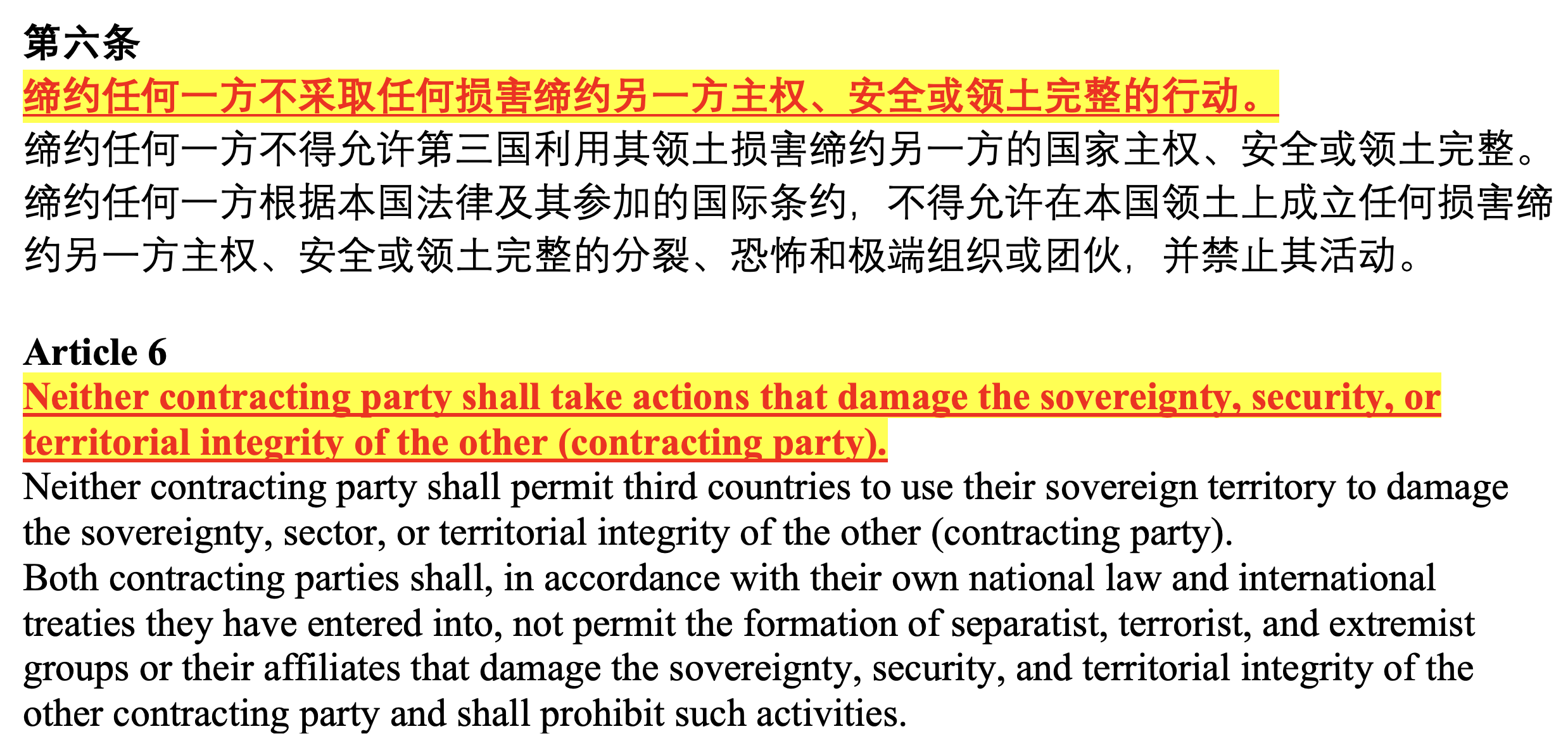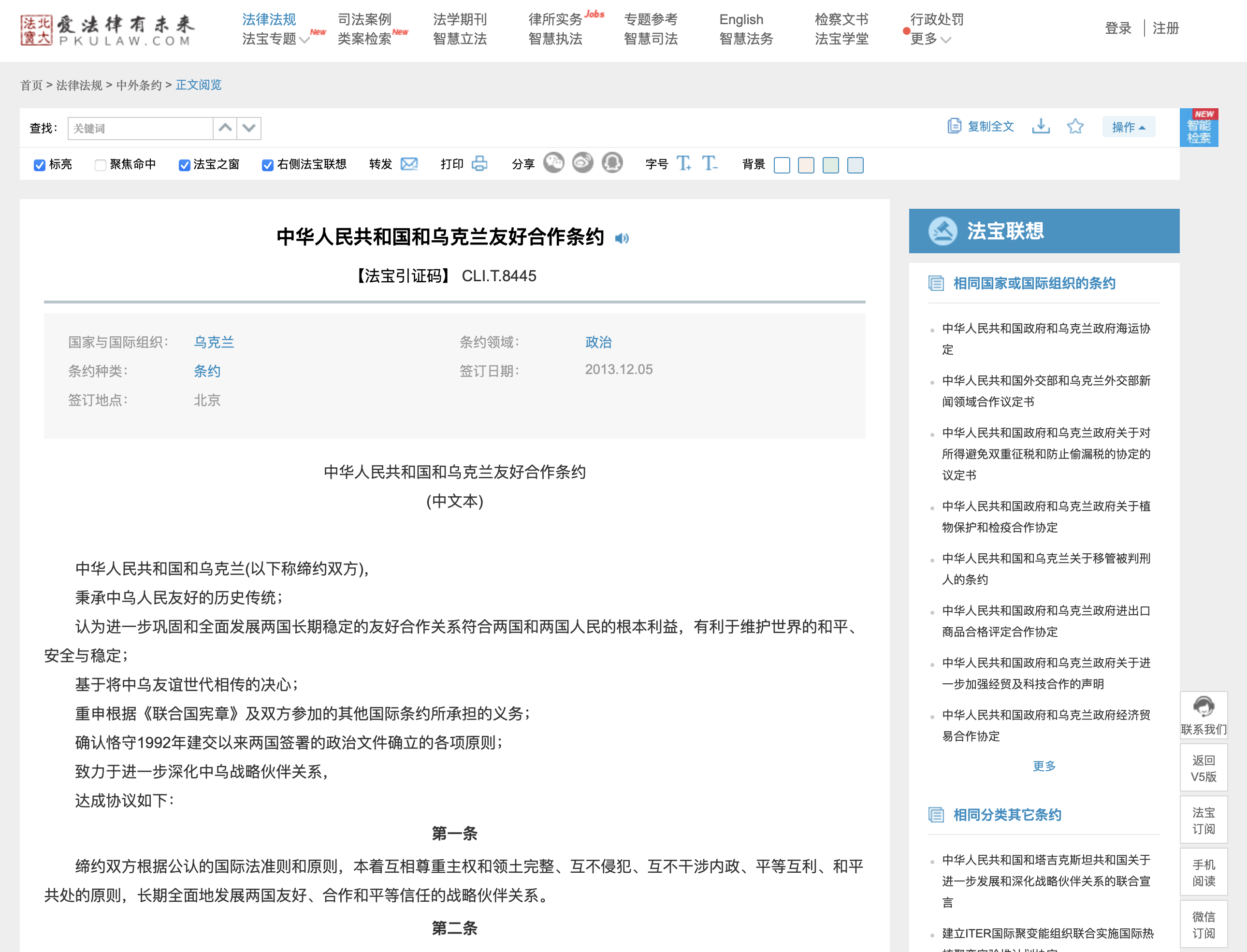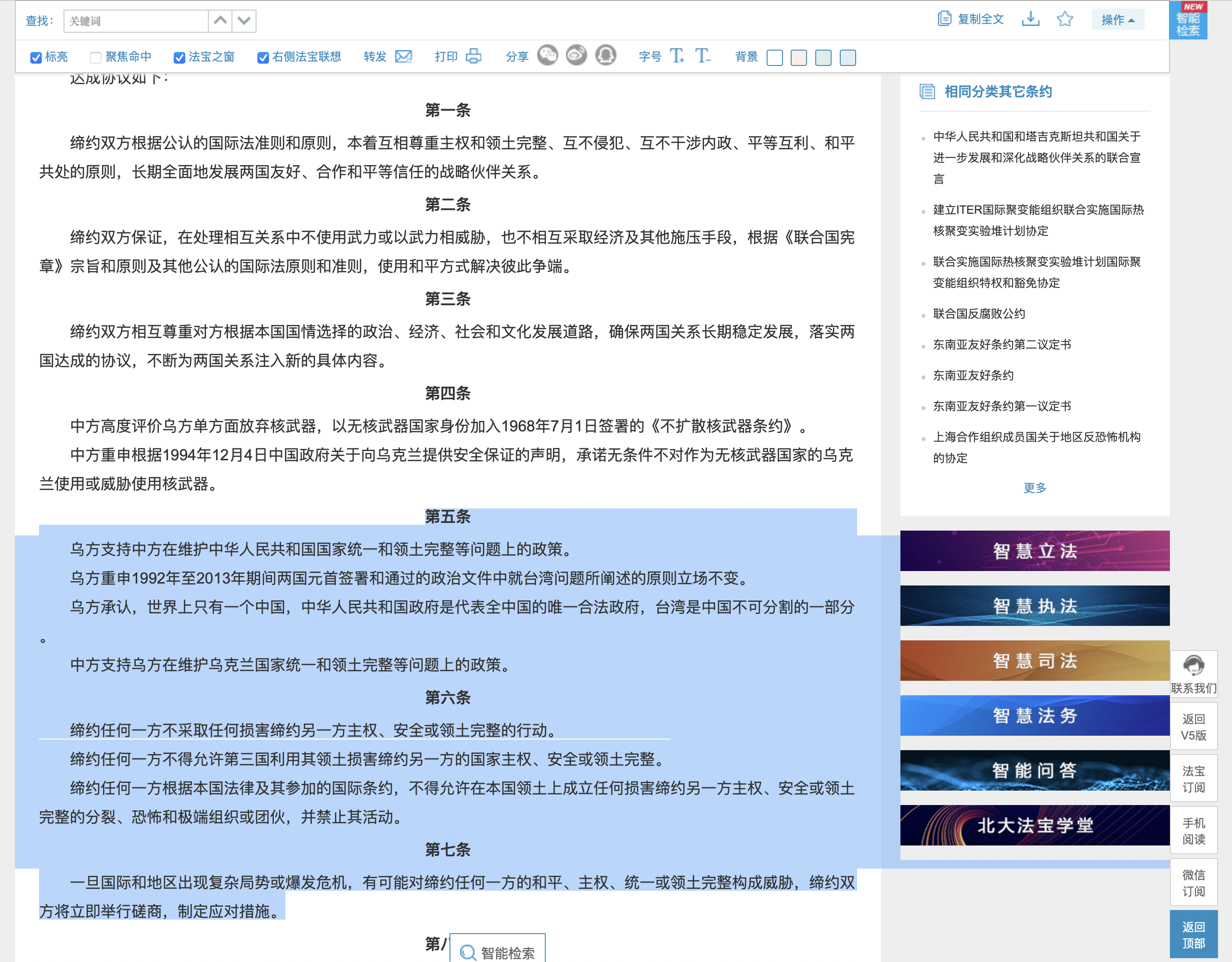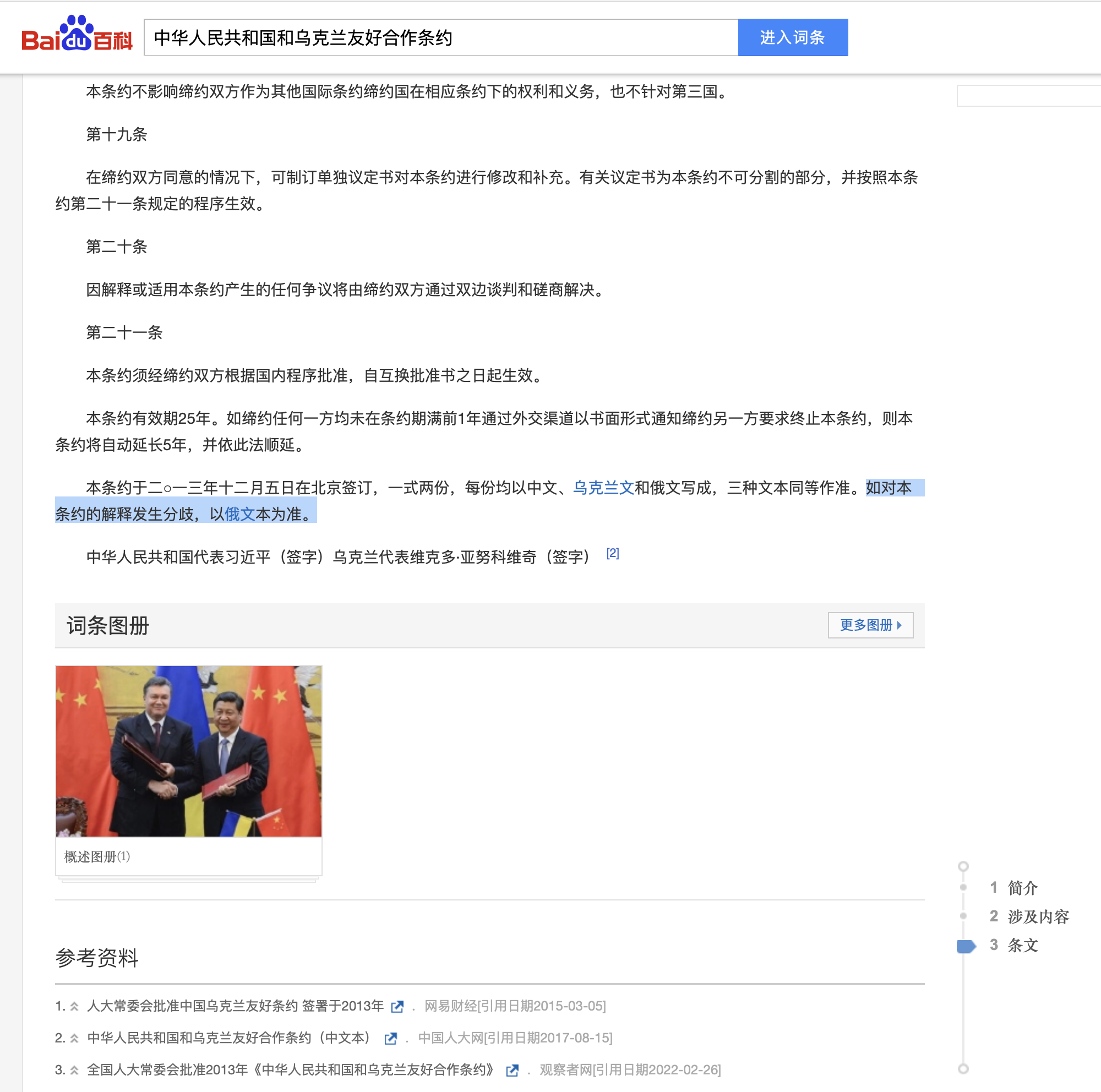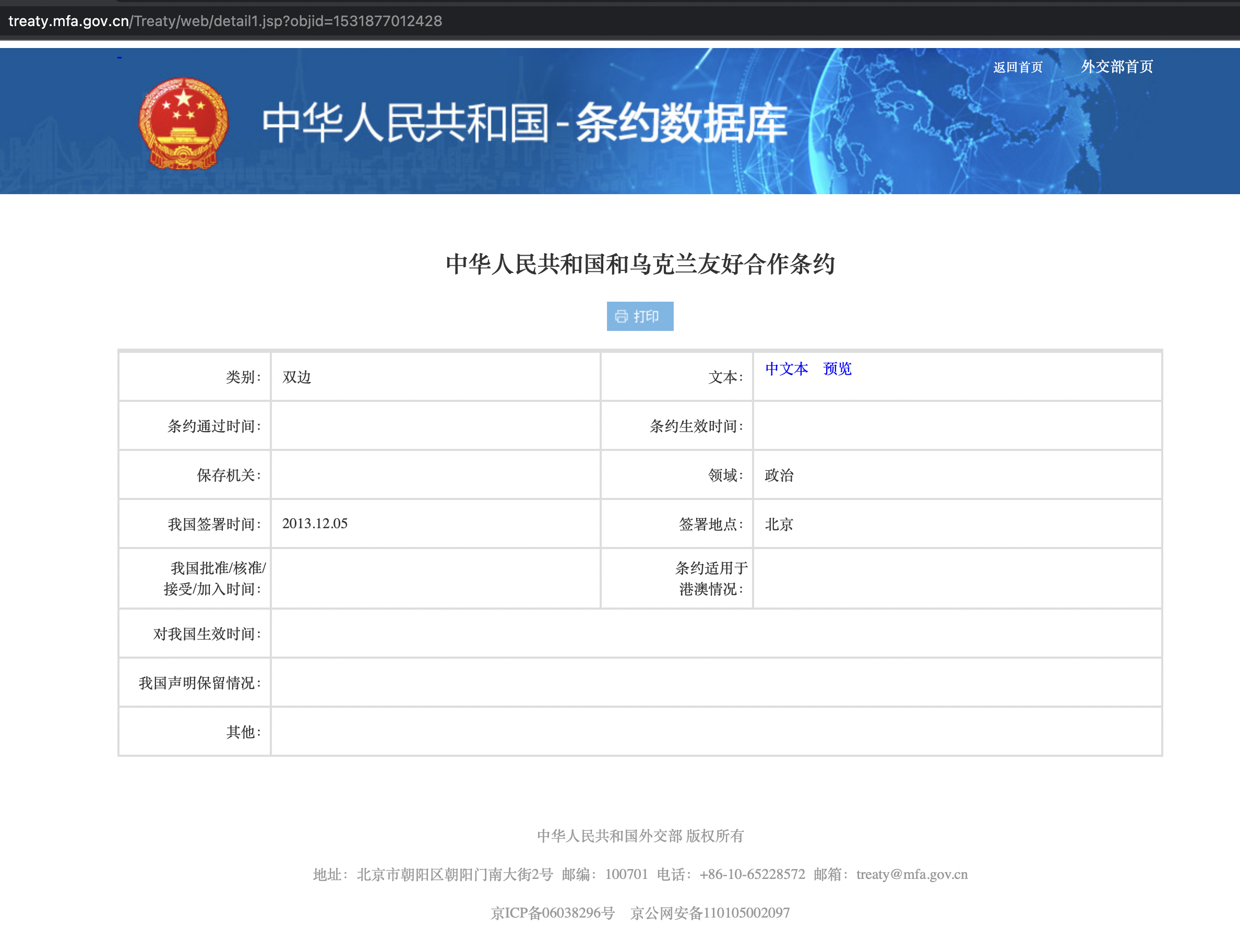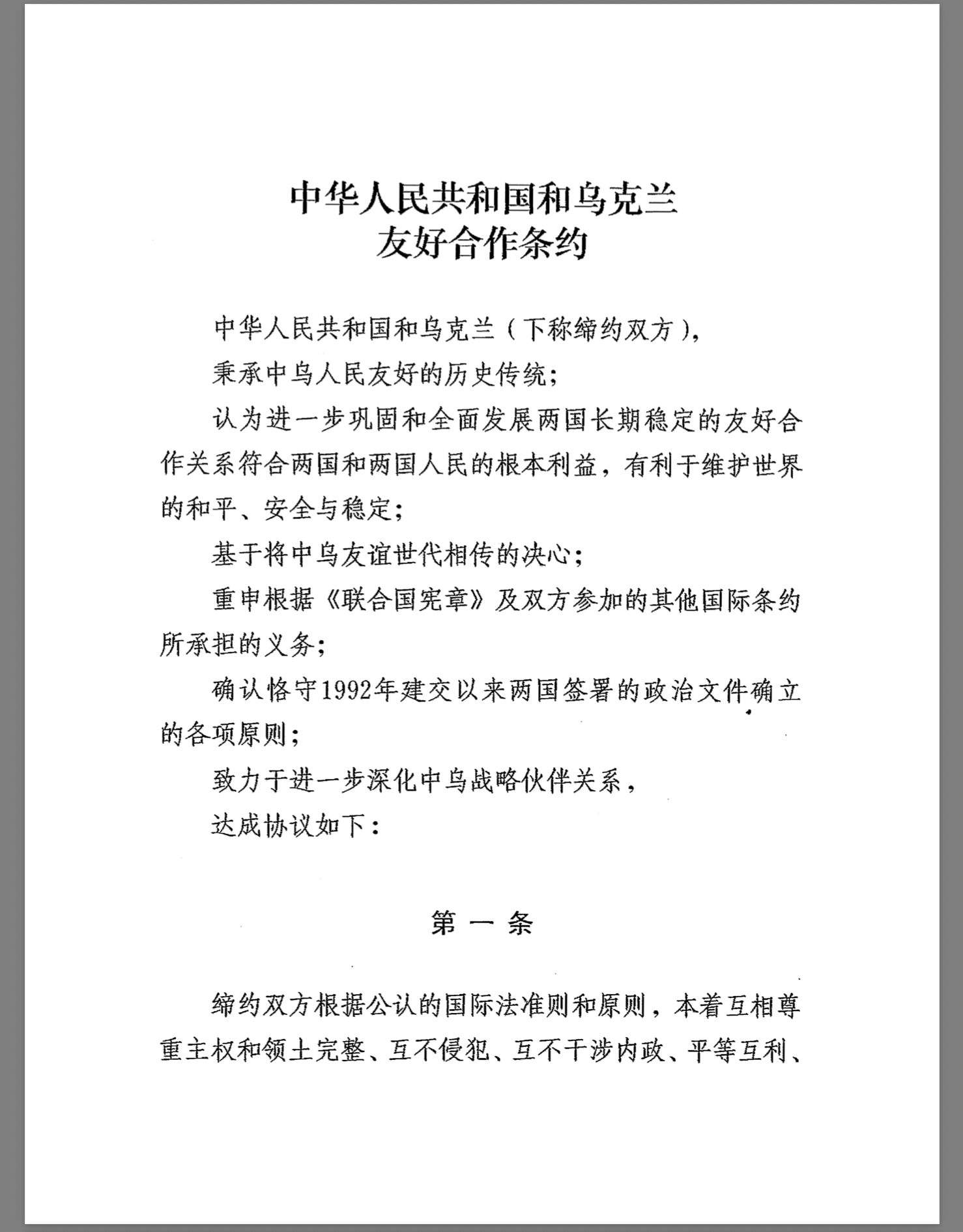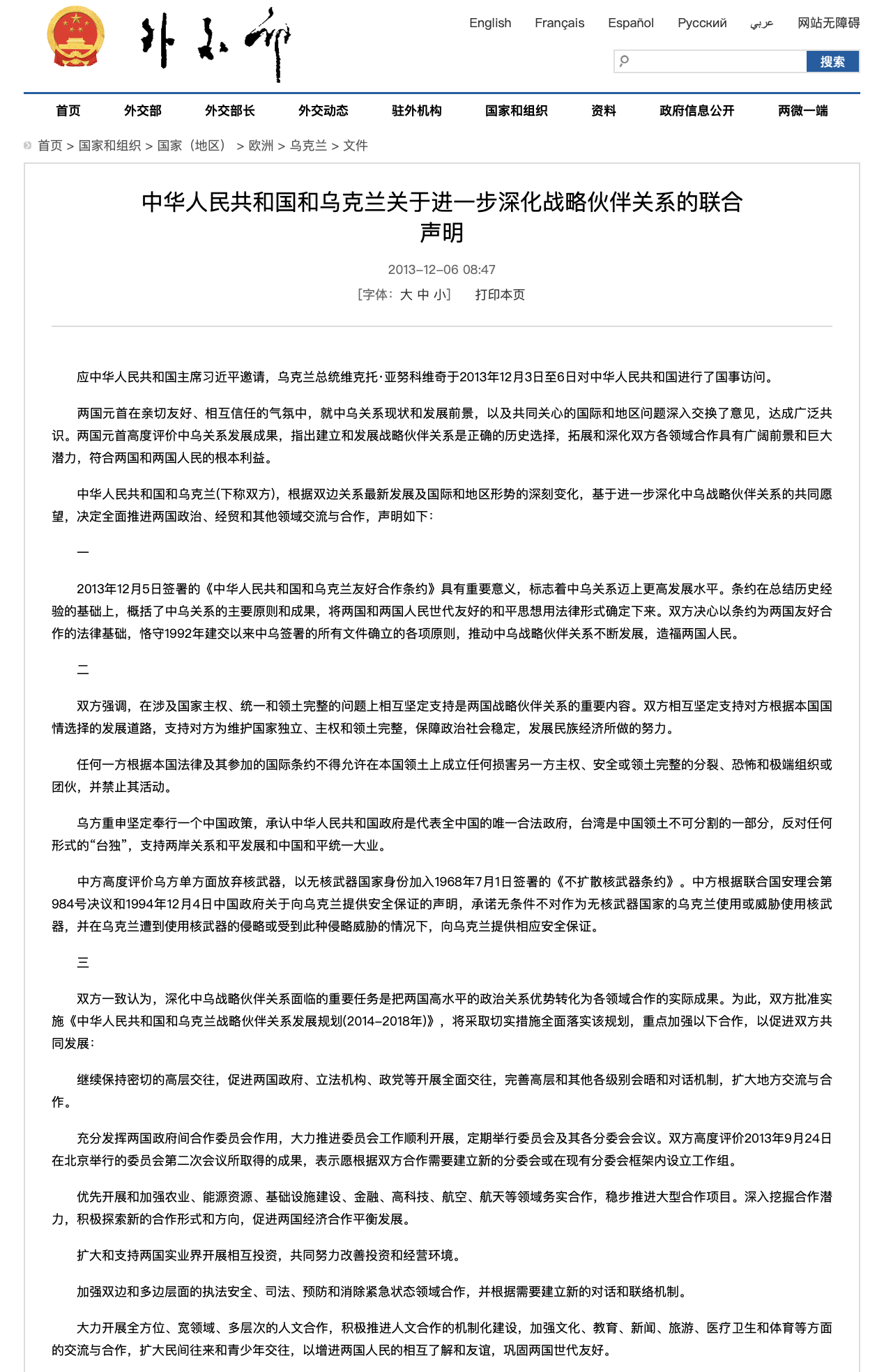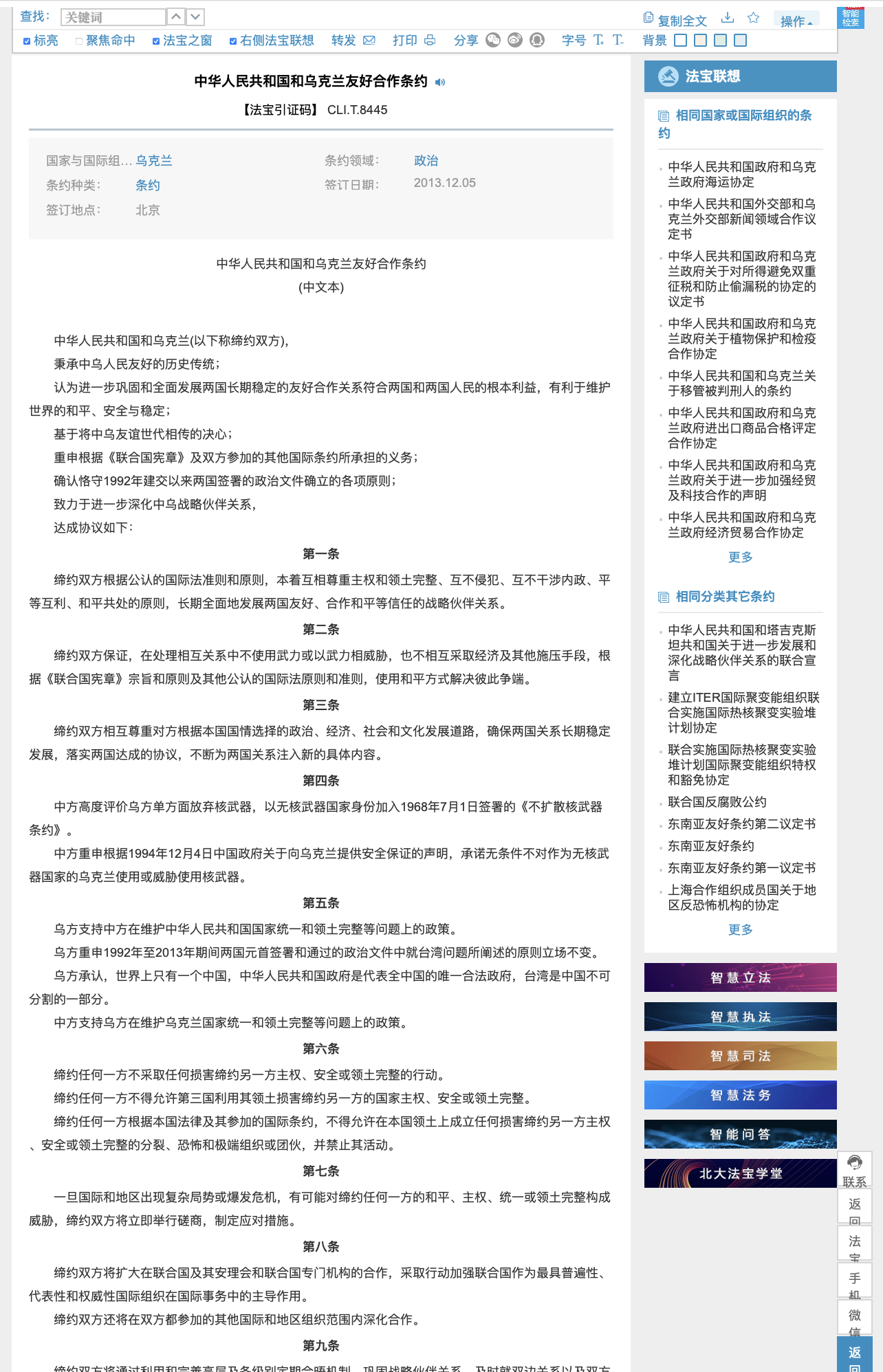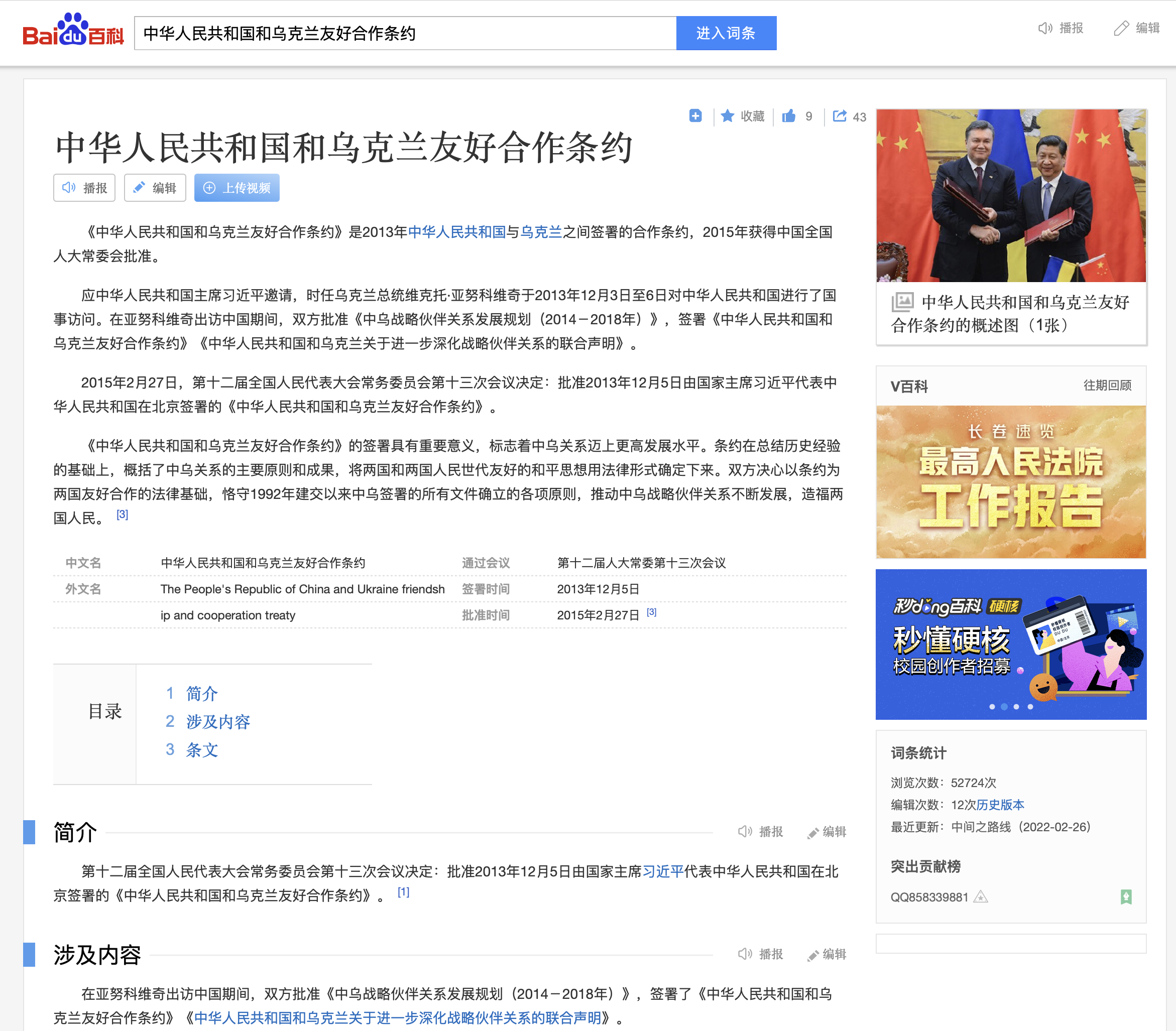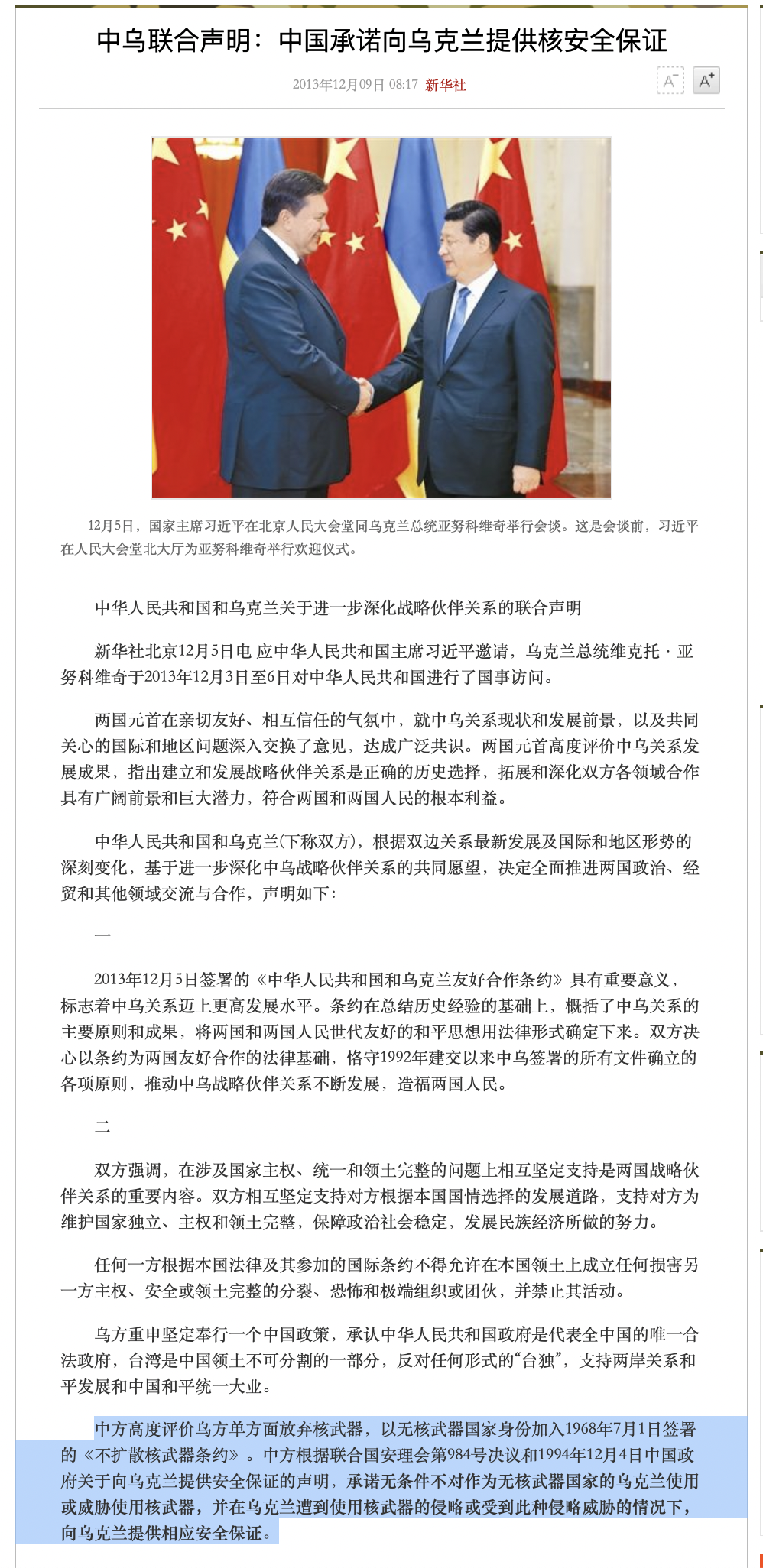2013 PRC-Ukraine Treaty of Friendship & Cooperation/Joint Communiqué: Russian, Ukrainian & Chinese Documents, Context, Timeline
Andrew S. Erickson, “2013 PRC-Ukraine Treaty of Friendship & Cooperation/Joint Communiqué: Russian, Ukrainian & Chinese Documents, Context, Timeline,” China Analysis from Original Sources 以第一手资料研究中国, 29 August 2022.
(Please note: The original post of 21 August 2022 has been updated to include full Chinese– and Ukrainian-language texts of the 2013 PRC-Ukraine Treaty of Friendship and Cooperation.)
Since the beginning of the conflict in Ukraine, China has generally refrained from questioning Ukraine’s sovereignty and territorial integrity, has urged the parties involved to resolve the differences through dialogue and negotiations, and has proposed peaceful settlements in theory. As such, China’s posture overall has largely avoid contradicting outright the language of the Ukraine-China Treaty of 2013. Of vital significance, however: to maintain friendly relations and cooperation with Russia and minimize questions concerning PRC paramount leader Xi Jinping’s personal embrace of Vladimir Putin and Sino-Russian cooperation, China has neither openly condemned Russia’s actions in Ukraine nor actively upheld the sovereignty and security provisions accorded to Ukraine as one of the two parties to the 2013 PRC-Ukraine Treaty of Friendship and Cooperation and associated Joint Communiqué.
Beyond the terrible tragedy continuing to unfold in Ukraine following Putin’s unjustifiable invasion, what is at stake is the credibility of PRC commitments. How, and to what extent, can others expect Beijing to commit to agreements it has made? This is directly relevant to understanding promises that Beijing made previously to Hong Kong and now offers to Taiwan in the form of Beijing’s version of the “1992 Consensus” (which does not appear explicitly mention the “different interpretations” of “one China” that the KMT previously emphasized, let alone acknowledge that many in the DPP and elsewhere in Taiwan never agreed to any form of “consensus”).
Himself the signatory representing China for the 2013 Sino-Ukrainian Treaty, Xi has also explicitly linked the “1992 consensus” to the “One Country, Two Systems” model now suffocating Hong Kong, and insists that Taiwan must accept the same. Beijing’s recently issued White Paper on “The Taiwan Question and China’s Reunification in the New Era” reflects a far less reassuring, far more coercive vision than any such PRC policy statement in recent decades. As Mainland Affairs Council (MAC) opinion polls and National Chengchi University (NCCU) Election Study Center polls indicate, a large and growing number of Taiwanese find PRC promises non-credible for these and related reasons. Professor Ian Chong (莊嘉穎), National University of Singapore, offers further insights in his scholarship.
Moving forward, not only will Beijing’s approaches toward Taipei become still-more important, but becoming an increasingly significant global power will require Beijing to make an array of additional security arrangements (even if none officially rise to the level of formal “alliances”). China’s previous support to the Rajapaksa government in Sri Lanka, and ongoing efforts in the Solomon Islands, show these are real, not hypothetical, concerns.
How the Sino-Ukraine Treaty plays out in practice is one way to assess PRC commitments on an issue less entangled with other PRC interests. There the PRC track record thus far suggests that even if Beijing keeps to the letter of agreements, it may well not be relied on to honor their spirit in practice. Of note, the 2013 Sino-Ukraine Treaty was signed before Putin’s annexation of Crimea, and it remains unclear what—if anything—Beijing did to support Ukrainian sovereignty and territorial integrity then. Nine years later, the same question remains.
Beijing may also attempt to blur the lines on key issues in extremely revisionist fashion. A leading example is PRC officials’ continued stating of outright falsehoods that deliberately conflate the long-established, and fundamentally different, U.S. “One China Policy” with the PRC “One China Principle.” Similarly extreme revisionism can be seen in PRC statements regarding the United Nations General Assembly Resolution 2758 (the Resolution on Admitting Peking). There is already a pattern of behavior that cannot and should not be ignored.
To further elucidate these vital issues, it is useful to consider not only the Chinese-language documents and analysis appended at the bottom of this post, but also the Russian- and Ukrainian-language documents made available and further contextualized immediately below. Special thanks to Ms. Anna B. Davis of the Naval War College’s Russia Maritime Studies Institute (RMSI) for her extensive linguistic and research assistance in this matter! If you have any further documents or insights to share, please kindly send them to me via <https://www.andrewerickson.com/contact/>.
CLICK HERE TO ACCESS ORIGINAL POST WITH MANY ACCOMPANYING EXHIBITS.
***
The Russian text of the Treaty of Friendship and Cooperation Between Ukraine and China signed in 2013 is not readily accessible in complete form. Publicly available news and government sites, including those of the Ukrainian government, do not appear to have the document in their Archives. Partial sources that offer some insights include the list of the legal documents signed between Ukraine and China since the beginning of their bilateral relations might be useful. Downloaded from the Ukrainian government’s Verkhovnaya Rada site (that of the Supreme Council of Ukraine, the sovereign democratic nation’s unicameral parliament), it is in English, and may be accessed here.
Ukrainian and Kazakhstani legal documents depository sites have the complete text of the Treaty, for which it is necessary to register and pay to download. There is also a partial text-demo of the document posted on both sites; the Ukrainian site has a document in the Ukrainian language. The available parts of the texts in Ukrainian and Russian and the links to the sites may be accessed here.
A cached copy of the full-text in Ukrainian of the PRC-Ukraine Treaty of Friendship and Cooperation (Договору про дружбу і співробітництво між Україною і Китайською Народною Республікою) is available here:
While in Beijing, President Viktor Yanukovych and his team signed roughly ten major documents on 5 December 2013, including the Treaty of Friendship and Cooperation. The complete text of the Joint Declaration of Ukraine and China to Further Deepen Strategic Partnership in Russian is available on the Chinese government site, and may be accessed here. The language and content read like the Treaty text, especially the part about ensuring security guarantees. The original document that addresses the issue of Beijing’s declared policies vis-à-vis Kyiv in detail is the Declaration by the Government of the People’s Republic of China issued on 4 December 1994 on ensuring security guarantees to Ukraine.
In the partial Russian text of the 2013 Treaty available online, Article 4 of the Treaty states:
Article 4
The Chinese Party greatly respects the decision of the Ukrainian Party unilaterally to give up nuclear weapons and join the Nuclear Non-Proliferation Treaty of July 1, 1968, as a non-nuclear weapon state.
Reaffirming the content of the Declaration by the Government of the People’s Republic of China issued on 4 December 1994 on ensuring security guarantees to Ukraine, the Chinese Party pledges under no circumstances to use or threaten to use nuclear weapons against Ukraine, which is a non-nuclear weapons state.
Below is a timeline of the major life-and-state-changing events in Ukraine prior, during, and after President Viktor Yanukovych’s December 2013 trip to Beijing and signing of the Treaty and other foundational documents with China.
Timeline
- 21 November 2013—Ukrainian “Maidan Protests” started after the Ukrainian government suspended the process of signing the agreement leading to Ukraine’s EU integration.
- 28 November 2013—That decision resulted in failure to sign the Ukraine-EU Association Agreement during the Vilnius summit.
- 1–8 December 2013—Mass protests and clashes with the police started in Kyiv while President Viktor Yanukovych conducted negotiations in Beijing.
- 5 December 2013—The leaders of China (Xi Jinping) and Ukraine (Viktor Yanukovych) signed the following major documents:
- Treaty of Friendship and Cooperation Between Ukraine and China
- Joint Declaration of Ukraine and China to Further Deepen Strategic Partnership
- The Program of the Strategic Partnership Between Ukraine and China for 2014–2018
- Agreement between the Government of Ukraine and the Government of the People’s Republic on technical and economic cooperation
- Protocol of Phytosanitary inspection requirements for soybean export from Ukraine to China between the Ministry of Agrarian Policy and Food of Ukraine and the General Administration of Quality Supervision, Inspection and Quarantine of the P.R. of China
- Protocol of Phytosanitary inspection requirements for barley export from Ukraine to China between the Ministry of Agrarian Policy and Food of Ukraine and the General Administration of Quality Supervision, Inspection and Quarantine of the P.R. of China
- Memorandum of Understanding between the State Agency of Ukraine for Tourism and Resorts and the National Tourism Administration of the People’s Republic of China on the promotion of group travel of Chinese tourists to Ukraine
- Memorandum of Understanding between the Ministry of Health of Ukraine and China’s State Administration of Traditional Chinese Medicine on Cooperation in the field of Traditional Chinese Medicine
- Agreement on cooperation in the areas of energy efficiency, energy conservation and renewable energy between the State Agency on Energy Efficiency and Energy Saving of Ukraine and China Export and Credit Insurance Corporation (SINOSURE)
- Agreement between the Ukrainian Union of Industrialists and Entrepreneurs and the China International Contractors Association
- 17 December 2013—Russia and Ukraine signed a deal that resulted in Russia giving Ukraine $15 billion dollars credit and discounts on gas prices without any conditions and demands for domestic reforms.
- In the Discussion Paper published by the Kyiv-based Institute of World Policy in 2016, Foreign Policy Audit: Ukraine – China, the authors state that the term of the Treaty between Ukraine and China was 10 years (page 18).
- Goncharuk, E. Hobova, V. Kiktenko, A. Koval, and S. Koshovy, authors; Olena Betliy, research coordinator; Foreign Policy Audit: Ukraine – China (Kyiv, Ukraine: Institute of World Policy, 2016).
- Click here to access the report.
- The entire package of the signed documents during President Viktor Yanukovych’s visit to China in December 2013 became the first legally binding foundation for further development of the Ukraine-China strategic partnership and practical cooperation in specific areas and industries at least until 2018—the established period for implementation of the Program of Strategic Partnership Between Ukraine and China, 2014–2018.
- 27 February 2014—Russian “green men” (Spetsnaz personnel without insignia) took control over the government building in the capital of Crimea raising Russia’s state flag.
- 16 March 2014—The “Independence of Crimea” Referendum took place.
- 18 March 2014—The Russian government voted and signed the treaty declaring the Republic of Crimea as a part of Russia.
- 15 May 2014—The Ukrainian Verkhovnaya Rada (Supreme Council of Ukraine, its parliament) ratified the Treaty of Friendship and Cooperation between Ukraine and China (five months after signing the Treaty).
- 4 June 2014—Xi Jinping sent a congratulatory telegram to the newly elected President of Ukraine, Petro Poroshenko, emphasizing China’s desire and commitment to further developing relations between China and Ukraine and strengthening strategic mutual trust.
- Institute of World Policy, Discussion Paper 2016, p. 19.
- 28 February 2015—The members of China’s Permanent All-China Committee of People’s Representatives ratified the Treaty with Ukraine (over a year after Ukraine and China signed the Treaty).
CHINESE-LANGUAGE DOCUMENTS & ANALYSIS:
As Putin wages war against Ukraine, and China’s position remains unclear heading into a high-level Sino-American meeting on this issue, the 2013 Joint Communiqué and Treaty that Beijing concluded with Kiev under Xi himself raises important questions about PRC commitments. Consider the first line of the actual Communiqué itself: “2013年12月5日签署的《中华人民共和国和乌克兰友好合作条约》具有重要意义,标志着中乌关系迈上更高发展水平。” [“There is important meaning to the ‘PRC-Ukraine Treaty of Friendship and Cooperation’ signed on December 5, 2013, signifying movement toward a heightened level of China-Ukrainian relations.”] Signed by Xi himself, the Treaty is in effect through 2038 (the 25-year mark).
Like the Treaty, the Communiqué is signed personally by Xi and Ukraine’s then-President Viktor Yanukovych. It thus represents Xi’s personal guarantee and commitment, given his central role in the PRC system. Articles 5, 6, and 7 of the Treaty—translated below—are particularly noteworthy, as they convey at least some form of PRC support for Ukraine’s “sovereignty, security, [and] territorial integrity.” This links them to the PRC’s own claims over Taiwan, as well as efforts to maintain control over its current territory. Should the Treaty thus be read to mean that China’s claims are important, but Ukraine’s are not… as it turns out?
How, and to what extent, can others expect Beijing to commit to agreements it has made? This is directly relevant to understanding promises that Beijing made previously to Hong Kong and now offers to Taiwan in the form of Beijing’s version of the “1992 Consensus” (which does not appear explicitly mention the “different interpretations” of “one China” that the KMT previously emphasized, let alone acknowledge that many in the DPP and elsewhere in Taiwan never agreed to any form of “consensus”). Moving forward, not only will Beijing’s approaches toward Taipei become increasingly important, but becoming an increasingly significant global power will require Beijing to make an array of additional security arrangements (even if none rise to the level of formal “alliances”). How much can Beijing’s partners, established and potential, expect it to live up to agreements, especially when real world events become complex and challenging—precisely the conditions under which agreements tend to matter most?
It is therefore long overdue for key interlocutors to ask PRC officials what exactly Xi’s 2013 agreements with Ukraine actually mean in practice, while public statements should hold China accountable. U.S. officials, such as White House Press Secretary Jen Psaki and Department of State Spokesperson Ned Price, should now say: “We expect China to honor its commitments to the 2013 Joint Communiqué/Treaty since they’re the foundation of PRC-Ukraine relations.” It is vital for European Allies and Partners to emphasize this in their own interactions with Beijing.
Any PRC acceptance of reported Russian requests for military assistance—including through cut-outs/agents, obviously—would violate the Treaty, especially Article 6.
The more Xi and his officials seek to avoid addressing the issue, the more credibility their commitments and reputation will lose. As China under Xi walks a tightrope and attempts to paper over its contradictions vis-à-vis the Ukraine and Russia, the world will be watching. Potential friends and foes of Beijing, and everyone in between, will factor the results into their decision-making.
Special thanks to Professor Ian Chong (莊嘉穎), National University of Singapore, for locating the Treaty documents, providing his provisional English-language translation, and allowing me to share it all here.
A partial text with free access to Articles 1-9 of the 2013 PRC-Ukraine Treaty of Friendship and Cooperation is available from Peking University Law School. The full text, complete with Articles 10-21, is directly available via Baidu. The FMPRC site does not provide the document, but does offer the Joint Statement accompanying it. All three texts are appended in full below, as well as a web posting of the Joint Statement credited to Xinhua.
Articles 5, 6, and 7 of the Treaty are particularly noteworthy. Prof. Chong’s translation follows. (If there is an official translation or a more accurate version, please send them—and any other relevant information—to www.andrewerickson.com/contact):
第五条
乌方支持中方在维护中华人民共和国国家统一和领土完整等问题上的政策。
乌方重申1992年至2013年期间两国元首签署和通过的政治文件中就台湾问题所阐述的原则立场不变。
乌方承认,世界上只有一个中国,中华人民共和国政府是代表全中国的唯一合法政府,台湾是中国不可分割的一部分。
中方支持乌方在维护乌克兰国家统一和领土完整等问题上的政策。
Article 5
Ukraine supports the PRC side’s policies on questions of national unification and territorial integrity. The Ukrainian side reiterates that the principles behind its statements on the Taiwan question remains unchanged from the political documents signed and ratified by the heads of state of the two countries between 1992 and 2013.
The Ukrainian side recognizes that there is only one China in the world and the PRC is the only legal government representing China, Taiwan is an inseparable part of China.
The Chinese side supports the efforts of the policies of Ukrainian side to protect the unity and territorial integrity of Ukraine and related questions.
第六条
缔约任何一方不采取任何损害缔约另一方主权、安全或领土完整的行动。
缔约任何一方不得允许第三国利用其领土损害缔约另一方的国家主权、安全或领土完整。
缔约任何一方根据本国法律及其参加的国际条约,不得允许在本国领土上成立任何损害缔约另一方主权、安全或领土完整的分裂、恐怖和极端组织或团伙,并禁止其活动。
Article 6
Neither contracting party shall take actions that damage the sovereignty, security, or territorial integrity of the other (contracting party).
Neither contracting party shall permit third countries to use their sovereign territory to damage the sovereignty, sector, or territorial integrity of the other (contracting party).
Both contracting parties shall, in accordance with their own national law and international treaties they have entered into, not permit the formation of separatist, terrorist, and extremist groups or their affiliates that damage the sovereignty, security, and territorial integrity of the other contracting party and shall prohibit such activities.
第七条
一旦国际和地区出现复杂局势或爆发危机,有可能对缔约任何一方的和平、主权、统一或领土完整构成威胁,缔约双方将立即举行磋商,制定应对措施。
Article 7
Once complicated situations emerge internationally or regionally that threaten the peace, sovereignty, unity, or territorial integrity of either contracting party, the contracting parties shall immediately begin discussions to develop countermeasures.
The final section offers interesting context, and rare case of the PRC allowing a language other than Chinese to be the authoritative one:
第二十一条
本条约须经缔约双方根据国内程序批准,自互换批准书之日起生效。本条约有效期25年。如缔约任何一方均未在条约期满前1年通过外交渠道以书面形式通知缔约另一方要求终止本条约,则本条约将自动延长5年,并依此法顺延。
本条约于二○一三年十二月五日在北京签订,一式两份,每份均以中文、乌克兰文和俄文写成,三种文本同等作准。如对本条约的解释发生分歧,以俄文本为准。
中华人民共和国代表习近平(签字)乌克兰代表维克多·亚努科维奇(签字
Article 21
This Treaty shall be subject to ratification by the Parties in accordance with their domestic procedures and shall enter into force on the date of the exchange of instruments of ratification. This Treaty shall remain in force for a period of 25 years. This Treaty shall be automatically extended for a period of 5 years and shall be renewed in accordance with this Law if either Party fails to notify the other Party in writing through diplomatic channels one year prior to the expiration of the Treaty requesting termination of the Treaty.
This Treaty was signed in Beijing on December 5, 2013, in two copies, each in Chinese, Ukrainian, and Russian; all three texts being equally authentic. In case of discrepancies in the interpretation of this Treaty, the Russian version shall prevail.
(Signed) Xi Jinping, Representative of the People’s Republic of China
(Signed) Viktor Yanukovych, Representative of Ukraine
The website of the Foreign Ministry of the People’s Republic of China (FMPRC) has the full text of the PRC-Ukraine Treaty of Friendship and Cooperation (中华人民共和国和乌克兰友好合作条约).
Basic background information on the Treaty is available here:
Here is the official Chinese-language full text of the Treaty:
The FMPRC’s website also has documents that refer to the Treaty (see highlighted segment).
The FMPRC website offers the full text of the Joint Communiqué accompanying the Treaty.
TEXT OF JOINT COMMUNIQUÉ REFERRING TO THE TREATY VIA THE PRC’S MINISTRY OF FOREIGN AFFAIRS:
(CLICK HERE TO DOWNLOAD A CACHED COPY.)
2013-12-06 08:47
[字体:大 中 小] 打印本页
应中华人民共和国主席习近平邀请,乌克兰总统维克托·亚努科维奇于2013年12月3日至6日对中华人民共和国进行了国事访问。
两国元首在亲切友好、相互信任的气氛中,就中乌关系现状和发展前景,以及共同关心的国际和地区问题深入交换了意见,达成广泛共识。两国元首高度评价中乌关系发展成果,指出建立和发展战略伙伴关系是正确的历史选择,拓展和深化双方各领域合作具有广阔前景和巨大潜力,符合两国和两国人民的根本利益。
中华人民共和国和乌克兰(下称双方),根据双边关系最新发展及国际和地区形势的深刻变化,基于进一步深化中乌战略伙伴关系的共同愿望,决定全面推进两国政治、经贸和其他领域交流与合作,声明如下:
一
2013年12月5日签署的《中华人民共和国和乌克兰友好合作条约》具有重要意义,标志着中乌关系迈上更高发展水平。条约在总结历史经验的基础上,概括了中乌关系的主要原则和成果,将两国和两国人民世代友好的和平思想用法律形式确定下来。双方决心以条约为两国友好合作的法律基础,恪守1992年建交以来中乌签署的所有文件确立的各项原则,推动中乌战略伙伴关系不断发展,造福两国人民。
二
双方强调,在涉及国家主权、统一和领土完整的问题上相互坚定支持是两国战略伙伴关系的重要内容。双方相互坚定支持对方根据本国国情选择的发展道路,支持对方为维护国家独立、主权和领土完整,保障政治社会稳定,发展民族经济所做的努力。
任何一方根据本国法律及其参加的国际条约不得允许在本国领土上成立任何损害另一方主权、安全或领土完整的分裂、恐怖和极端组织或团伙,并禁止其活动。
乌方重申坚定奉行一个中国政策,承认中华人民共和国政府是代表全中国的唯一合法政府,台湾是中国领土不可分割的一部分,反对任何形式的“台独”,支持两岸关系和平发展和中国和平统一大业。
中方高度评价乌方单方面放弃核武器,以无核武器国家身份加入1968年7月1日签署的《不扩散核武器条约》。中方根据联合国安理会第984号决议和1994年12月4日中国政府关于向乌克兰提供安全保证的声明,承诺无条件不对作为无核武器国家的乌克兰使用或威胁使用核武器,并在乌克兰遭到使用核武器的侵略或受到此种侵略威胁的情况下,向乌克兰提供相应安全保证。
三
双方一致认为,深化中乌战略伙伴关系面临的重要任务是把两国高水平的政治关系优势转化为各领域合作的实际成果。为此,双方批准实施《中华人民共和国和乌克兰战略伙伴关系发展规划(2014-2018年)》,将采取切实措施全面落实该规划,重点加强以下合作,以促进双方共同发展:
继续保持密切的高层交往,促进两国政府、立法机构、政党等开展全面交往,完善高层和其他各级别会晤和对话机制,扩大地方交流与合作。
充分发挥两国政府间合作委员会作用,大力推进委员会工作顺利开展,定期举行委员会及其各分委会会议。双方高度评价2013年9月24日在北京举行的委员会第二次会议所取得的成果,表示愿根据双方合作需要建立新的分委会或在现有分委会框架内设立工作组。
优先开展和加强农业、能源资源、基础设施建设、金融、高科技、航空、航天等领域务实合作,稳步推进大型合作项目。深入挖掘合作潜力,积极探索新的合作形式和方向,促进两国经济合作平衡发展。
扩大和支持两国实业界开展相互投资,共同努力改善投资和经营环境。
加强双边和多边层面的执法安全、司法、预防和消除紧急状态领域合作,并根据需要建立新的对话和联络机制。
大力开展全方位、宽领域、多层次的人文合作,积极推进人文合作的机制化建设,加强文化、教育、新闻、旅游、医疗卫生和体育等方面的交流与合作,扩大民间往来和青少年交往,以增进两国人民的相互了解和友谊,巩固两国世代友好。
四
双方将根据国际法、双边条约和各自法律,采取有效措施促进双方人员往来,保障对方国家公民和法人在本国境内的合法权益,为深化中乌各领域合作创造更加有利的条件。
五
双方将继续加强在联合国等多边框架内的对话与协作,就共同关心的国际和地区问题保持密切沟通与配合,为两国发展营造良好的国际环境。
双方指出,联合国在维护世界和平、促进共同发展和推动国际合作方面发挥着核心作用。双方主张切实遵循《联合国宪章》的宗旨和原则,和平解决国际争端和热点问题,反对动辄诉诸武力或以武力相威胁,反对一切形式的恐怖主义。双方愿在打击恐怖主义、分裂主义和极端主义及其他犯罪活动方面加强合作。
双方愿与国际社会携手努力,推进国际关系民主化进程,共同应对全球性和区域性挑战,推动建立更加公正、合理的国际秩序。
双方主张加强宏观经济政策协调,积极参与全球经济治理进程,推动贸易和投资自由化便利化,反对各种形式的贸易和投资保护主义和歧视行为。
六
乌克兰总统维克托·亚努科维奇邀请中华人民共和国主席习近平在方便的时候访问乌克兰。中华人民共和国主席习近平表示感谢并愉快地接受了邀请。访问时间将通过外交渠道商定。
中华人民共和国 乌克兰
主席 总统
习近平 维克托·亚努科维奇
二0一三年十二月五日于北京
PARTIAL TEXT OF THE TREATY AVAILABLE VIA PEKING UNIVERSITY LAW SCHOOL:
[ARTICLES 1–9 DIRECTLY ACCESSIBLE; ADDITIONAL CONTENT REQUIRES REGISTRATION)]
(CLICK HERE TO DOWNLOAD A CACHED COPY.)
【法宝引证码】 CLI.T.8445
中华人民共和国和乌克兰友好合作条约
(中文本)
中华人民共和国和乌克兰(以下称缔约双方),
秉承中乌人民友好的历史传统;
认为进一步巩固和全面发展两国长期稳定的友好合作关系符合两国和两国人民的根本利益,有利于维护世界的和平、安全与稳定;
基于将中乌友谊世代相传的决心;
重申根据《联合国宪章》及双方参加的其他国际条约所承担的义务;
确认恪守1992年建交以来两国签署的政治文件确立的各项原则;
致力于进一步深化中乌战略伙伴关系,
达成协议如下:
第一条
缔约双方根据公认的国际法准则和原则,本着互相尊重主权和领土完整、互不侵犯、互不干涉内政、平等互利、和平共处的原则,长期全面地发展两国友好、合作和平等信任的战略伙伴关系。
第二条
缔约双方保证,在处理相互关系中不使用武力或以武力相威胁,也不相互采取经济及其他施压手段,根据《联合国宪章》宗旨和原则及其他公认的国际法原则和准则,使用和平方式解决彼此争端。
第三条
缔约双方相互尊重对方根据本国国情选择的政治、经济、社会和文化发展道路,确保两国关系长期稳定发展,落实两国达成的协议,不断为两国关系注入新的具体内容。
第四条
中方高度评价乌方单方面放弃核武器,以无核武器国家身份加入1968年7月1日签署的《不扩散核武器条约》。
中方重申根据1994年12月4日中国政府关于向乌克兰提供安全保证的声明,承诺无条件不对作为无核武器国家的乌克兰使用或威胁使用核武器。
第五条
乌方支持中方在维护中华人民共和国国家统一和领土完整等问题上的政策。
乌方重申1992年至2013年期间两国元首签署和通过的政治文件中就台湾问题所阐述的原则立场不变。
乌方承认,世界上只有一个中国,中华人民共和国政府是代表全中国的唯一合法政府,台湾是中国不可分割的一部分。
中方支持乌方在维护乌克兰国家统一和领土完整等问题上的政策。
第六条
缔约任何一方不采取任何损害缔约另一方主权、安全或领土完整的行动。
缔约任何一方不得允许第三国利用其领土损害缔约另一方的国家主权、安全或领土完整。
缔约任何一方根据本国法律及其参加的国际条约,不得允许在本国领土上成立任何损害缔约另一方主权、安全或领土完整的分裂、恐怖和极端组织或团伙,并禁止其活动。
第七条
一旦国际和地区出现复杂局势或爆发危机,有可能对缔约任何一方的和平、主权、统一或领土完整构成威胁,缔约双方将立即举行磋商,制定应对措施。
第八条
缔约双方将扩大在联合国及其安理会和联合国专门机构的合作,采取行动加强联合国作为最具普遍性、代表性和权威性国际组织在国际事务中的主导作用。
缔约双方还将在双方都参加的其他国际和地区组织范围内深化合作。
第九条
缔约双方将通过利用和完善高层及各级别定期会晤机制,巩固战略伙伴关系,及时就双边关系以及双方共同关心的重大问题交换意见。
第十条
APPARENT FULL TEXT OF THE TREATY VIA BAIDU BAIKE:
(CLICK HERE TO DOWNLOAD A CACHED COPY.)
播报 编辑 上传视频
《中华人民共和国和乌克兰友好合作条约》是2013年中华人民共和国与乌克兰之间签署的合作条约,2015年获得中国全国人大常委会批准。
应中华人民共和国主席习近平邀请,时任乌克兰总统维克托·亚努科维奇于2013年12月3日至6日对中华人民共和国进行了国事访问。在亚努科维奇出访中国期间,双方批准《中乌战略伙伴关系发展规划(2014-2018年)》,签署《中华人民共和国和乌克兰友好合作条约》《中华人民共和国和乌克兰关于进一步深化战略伙伴关系的联合声明》。
2015年2月27日,第十二届全国人民代表大会常务委员会第十三次会议决定:批准2013年12月5日由国家主席习近平代表中华人民共和国在北京签署的《中华人民共和国和乌克兰友好合作条约》。
《中华人民共和国和乌克兰友好合作条约》的签署具有重要意义,标志着中乌关系迈上更高发展水平。条约在总结历史经验的基础上,概括了中乌关系的主要原则和成果,将两国和两国人民世代友好的和平思想用法律形式确定下来。双方决心以条约为两国友好合作的法律基础,恪守1992年建交以来中乌签署的所有文件确立的各项原则,推动中乌战略伙伴关系不断发展,造福两国人民。 [3]
中文名
中华人民共和国和乌克兰友好合作条约
外文名
The People’s Republic of China and Ukraine friendship and cooperation treaty
通过会议
第十二届人大常委第十三次会议
签署时间
2013年12月5日
批准时间
2015年2月27日 [3]
目录
简介
编辑 播报
第十二届全国人民代表大会常务委员会第十三次会议决定:批准2013年12月5日由国家主席习近平代表中华人民共和国在北京签署的《中华人民共和国和乌克兰友好合作条约》。 [1]
涉及内容
编辑 播报
在亚努科维奇出访中国期间,双方批准《中乌战略伙伴关系发展规划(2014-2018年)》,签署了《中华人民共和国和乌克兰友好合作条约》《中华人民共和国和乌克兰关于进一步深化战略伙伴关系的联合声明》。
中国国家主席习近平与时任乌克兰总统亚努科维奇共同签署《中华人民共和国和乌克兰友好合作条约》、《中华人民共和国和乌克兰关于进一步深化战略伙伴关系的联合声明》。
《中华人民共和国和乌克兰友好合作条约》的签署具有重要意义,标志着中乌关系迈上更高发展水平。条约在总结历史经验的基础上,概括了中乌关系的主要原则和成果,将两国和两国人民世代友好的和平思想用法律形式确定下来。双方决心以条约为两国友好合作的法律基础,恪守1992年建交以来中乌签署的所有文件确立的各项原则,推动中乌战略伙伴关系不断发展,造福两国人民。
据美国之音广播电台网站报道,彼时的乌克兰面临严重的经济危机、资金短缺,社会不满情绪高涨,亚努科维奇期望中国能提供巨额援助。
在2013年同时签署的进一步深化战略伙伴关系的联合声明中,中国重申了保护乌克兰不受核武器威胁的承诺。中国于1994年向乌克兰提供安全保证,1995年向同样放弃核武器的哈萨克斯坦提供安全保证。
这次的声明中写道,中方高度评价乌方单方面放弃核武器,以无核武器国家身份加入1968年7月1日签署的《不扩散核武器条约》。中方根据联合国安理会第984号决议和1994年12月4日中国政府关于向乌克兰提供安全保证的声明,承诺无条件不对作为无核武器国家的乌克兰使用或威胁使用核武器,并在乌克兰遭到使用核武器的侵略或受到此种侵略威胁的情况下,向乌克兰提供相应安全保证。 [1]
条文
编辑 播报
中华人民共和国和乌克兰(以下称缔约双方),
秉承中乌人民友好的历史传统;
认为进一步巩固和全面发展两国长期稳定的友好合作关系符合两国和两国人民的根本利益,有利于维护世界的和平、安全与稳定;
基于将中乌友谊世代相传的决心;
重申根据《联合国宪章》及双方参加的其他国际条约所承担的义务;
确认恪守1992年建交以来两国签署的政治文件确立的各项原则;
致力于进一步深化中乌战略伙伴关系,
达成协议如下:
第一条
缔约双方根据公认的国际法准则和原则,本着互相尊重主权和领土完整、互不侵犯、互不干涉内政、平等互利、和平共处的原则,长期全面地发展两国友好、合作和平等信任的战略伙伴关系。
第二条
缔约双方保证,在处理相互关系中不使用武力或以武力相威胁,也不相互采取经济及其他施压手段,根据《联合国宪章》宗旨和原则及其他公认的国际法原则和准则,使用和平方式解决彼此争端。
第三条
缔约双方相互尊重对方根据本国国情选择的政治、经济、社会和文化发展道路,确保两国关系长期稳定发展,落实两国达成的协议,不断为两国关系注入新的具体内容。
第四条
中方高度评价乌方单方面放弃核武器,以无核武器国家身份加入1968年7月1日签署的《不扩散核武器条约》。
中方重申根据1994年12月4日中国政府关于向乌克兰提供安全保证的声明,承诺无条件不对作为无核武器国家的乌克兰使用或威胁使用核武器。
第五条
乌方支持中方在维护中华人民共和国国家统一和领土完整等问题上的政策。
乌方重申1992年至2013年期间两国元首签署和通过的政治文件中就台湾问题所阐述的原则立场不变。
乌方承认,世界上只有一个中国,中华人民共和国政府是代表全中国的唯一合法政府,台湾是中国不可分割的一部分。
中方支持乌方在维护乌克兰国家统一和领土完整等问题上的政策。
第六条
缔约任何一方不采取任何损害缔约另一方主权、安全或领土完整的行动。
缔约任何一方不得允许第三国利用其领土损害缔约另一方的国家主权、安全或领土完整。
缔约任何一方根据本国法律及其参加的国际条约,不得允许在本国领土上成立任何损害缔约另一方主权、安全或领土完整的分裂、恐怖和极端组织或团伙,并禁止其活动。
第七条
一旦国际和地区出现复杂局势或爆发危机,有可能对缔约任何一方的和平、主权、统一或领土完整构成威胁,缔约双方将立即举行磋商,制定应对措施。
第八条
缔约双方将扩大在联合国及其安理会和联合国专门机构的合作,采取行动加强联合国作为最具普遍性、代表性和权威性国际组织在国际事务中的主导作用。
缔约双方还将在双方都参加的其他国际和地区组织范围内深化合作。
第九条
缔约双方将通过利用和完善高层及各级别定期会晤机制,巩固战略伙伴关系,及时就双边关系以及双方共同关心的重大问题交换意见。
第十条
缔约双方将在平等互利的基础上,扩大和深化经贸、农业、采矿、能源、交通、基础设施、航天航空、金融、投资、科技、通信及其他双方感兴趣领域的合作。
缔约双方将在国际金融体系、经济组织和论坛框架内开展合作。
缔约双方将根据本国法律及共同参加的国际条约确保保护知识产权,包括专利权、商标权、著作权和相关权等。
第十一条
缔约双方积极鼓励文化、教育、科学、旅游、医疗卫生、新闻、社会保障、体育、环保以及其他双方感兴趣领域的协调与合作。
第十二条
缔约双方将根据此前达成的协议和协定开展不针对第三国的军事和军技合作,并采取必要措施,以巩固国际安全及缔约双方的安全。
第十三条
缔约双方根据本国法律和各自承担的国际义务,在双边和多边基础上开展合作,共同打击恐怖主义、分裂主义和极端主义,以及有组织犯罪、非法移民、贩卖人口,非法贩运麻醉品、精神药物及其前体,非法贩运有毒物质及放射性材料和武器,合作打击大规模杀伤性武器及其运载工具扩散,以及其他形式跨国犯罪,确保两国在信息安全领域的利益。
第十四条
缔约双方根据本国法律创造必要条件,推动两国省州、友好城市加强友好往来和互利合作。
第十五条
缔约双方将大力推动两国人员、政府及民间组织、工会、企业界、社会团体、教育、文化及科研机构、媒体、青年和体育组织扩大交往。
缔约双方将采取必要措施,为双方公民往来创造更加有利的条件,以增进两国人民的相互了解和友谊。
第十六条
缔约双方将根据各自承担的国际义务及本国法律在促进实现基本自由和人权方面进行合作。
缔约双方将根据各自承担的国际义务以及各自的法律,采取有效措施,保障缔约一方法人和自然人在缔约另一方境内的安全与合法权益,并相互提供民事和刑事司法协助。
缔约双方有关部门将根据本国法律调查与解决缔约一方的法人和自然人在缔约另一方境内进行合作和经营过程中出现的问题和纠纷。
第十七条
为执行本条约,缔约双方将积极推动在双方感兴趣的具体领域签订相关协议。
第十八条
本条约不影响缔约双方作为其他国际条约缔约国在相应条约下的权利和义务,也不针对第三国。
第十九条
在缔约双方同意的情况下,可制订单独议定书对本条约进行修改和补充。有关议定书为本条约不可分割的部分,并按照本条约第二十一条规定的程序生效。
第二十条
因解释或适用本条约产生的任何争议将由缔约双方通过双边谈判和磋商解决。
第二十一条
本条约须经缔约双方根据国内程序批准,自互换批准书之日起生效。
本条约有效期25年。如缔约任何一方均未在条约期满前1年通过外交渠道以书面形式通知缔约另一方要求终止本条约,则本条约将自动延长5年,并依此法顺延。
本条约于二○一三年十二月五日在北京签订,一式两份,每份均以中文、乌克兰文和俄文写成,三种文本同等作准。如对本条约的解释发生分歧,以俄文本为准。
中华人民共和国代表习近平(签字)乌克兰代表维克多·亚努科维奇(签字) [2]
词条图册更多图册
参考资料
- 人大常委会批准中国乌克兰友好条约 签署于2013年 .网易财经[引用日期2015-03-05]
- 中华人民共和国和乌克兰友好合作条约(中文本) .中国人大网[引用日期2017-08-15]
- 全国人大常委会批准2013年《中华人民共和国和乌克兰友好合作条约》 .观察者网[引用日期2022-02-26]
FINALLY, HERE IS WHAT IS APPARENTLY XINHUA’S COVERAGE OF THE JOINT COMMUNIQUÉ FROM THE TIME THAT IT WAS RELEASED:
中乌联合声明:中国承诺向乌克兰提供核安全保证
2013年12月09日 08:17 新华社
12月5日,国家主席习近平在北京人民大会堂同乌克兰总统亚努科维奇举行会谈。这是会谈前,习近平在人民大会堂北大厅为亚努科维奇举行欢迎仪式。
中华人民共和国和乌克兰关于进一步深化战略伙伴关系的联合声明
新华社北京12月5日电 应中华人民共和国主席习近平邀请,乌克兰总统维克托·亚努科维奇于2013年12月3日至6日对中华人民共和国进行了国事访问。
两国元首在亲切友好、相互信任的气氛中,就中乌关系现状和发展前景,以及共同关心的国际和地区问题深入交换了意见,达成广泛共识。两国元首高度评价中乌关系发展成果,指出建立和发展战略伙伴关系是正确的历史选择,拓展和深化双方各领域合作具有广阔前景和巨大潜力,符合两国和两国人民的根本利益。
中华人民共和国和乌克兰(下称双方),根据双边关系最新发展及国际和地区形势的深刻变化,基于进一步深化中乌战略伙伴关系的共同愿望,决定全面推进两国政治、经贸和其他领域交流与合作,声明如下:
一
2013年12月5日签署的《中华人民共和国和乌克兰友好合作条约》具有重要意义,标志着中乌关系迈上更高发展水平。条约在总结历史经验的基础上,概括了中乌关系的主要原则和成果,将两国和两国人民世代友好的和平思想用法律形式确定下来。双方决心以条约为两国友好合作的法律基础,恪守1992年建交以来中乌签署的所有文件确立的各项原则,推动中乌战略伙伴关系不断发展,造福两国人民。
二
双方强调,在涉及国家主权、统一和领土完整的问题上相互坚定支持是两国战略伙伴关系的重要内容。双方相互坚定支持对方根据本国国情选择的发展道路,支持对方为维护国家独立、主权和领土完整,保障政治社会稳定,发展民族经济所做的努力。
任何一方根据本国法律及其参加的国际条约不得允许在本国领土上成立任何损害另一方主权、安全或领土完整的分裂、恐怖和极端组织或团伙,并禁止其活动。
乌方重申坚定奉行一个中国政策,承认中华人民共和国政府是代表全中国的唯一合法政府,台湾是中国领土不可分割的一部分,反对任何形式的“台独”,支持两岸关系和平发展和中国和平统一大业。
中方高度评价乌方单方面放弃核武器,以无核武器国家身份加入1968年7月1日签署的《不扩散核武器条约》。中方根据联合国安理会第984号决议和1994年12月4日中国政府关于向乌克兰提供安全保证的声明,承诺无条件不对作为无核武器国家的乌克兰使用或威胁使用核武器,并在乌克兰遭到使用核武器的侵略或受到此种侵略威胁的情况下,向乌克兰提供相应安全保证。
三
双方一致认为,深化中乌战略伙伴关系面临的重要任务是把两国高水平的政治关系优势转化为各领域合作的实际成果。为此,双方批准实施《中华人民共和国和乌克兰战略伙伴关系发展规划(2014-2018年)》,将采取切实措施全面落实该规划,重点加强以下合作,以促进双方共同发展:
继续保持密切的高层交往,促进两国政府、立法机构、政党等开展全面交往,完善高层和其他各级别会晤和对话机制,扩大地方交流与合作。
充分发挥两国政府间合作委员会作用,大力推进委员会工作顺利开展,定期举行委员会及其各分委会会议。双方高度评价2013年9月24日在北京举行的委员会第二次会议所取得的成果,表示愿根据双方合作需要建立新的分委会或在现有分委会框架内设立工作组。
优先开展和加强农业、能源资源、基础设施建设、金融、高科技、航空、航天等领域务实合作,稳步推进大型合作项目。深入挖掘合作潜力,积极探索新的合作形式和方向,促进两国经济合作平衡发展。
扩大和支持两国实业界开展相互投资,共同努力改善投资和经营环境。
加强双边和多边层面的执法安全、司法、预防和消除紧急状态领域合作,并根据需要建立新的对话和联络机制。
大力开展全方位、宽领域、多层次的人文合作,积极推进人文合作的机制化建设,加强文化、教育、新闻、旅游、医疗卫生和体育等方面的交流与合作,扩大民间往来和青少年交往,以增进两国人民的相互了解和友谊,巩固两国世代友好。
四
双方将根据国际法、双边条约和各自法律,采取有效措施促进双方人员往来,保障对方国家公民和法人在本国境内的合法权益,为深化中乌各领域合作创造更加有利的条件。
五
双方将继续加强在联合国等多边框架内的对话与协作,就共同关心的国际和地区问题保持密切沟通与配合,为两国发展营造良好的国际环境。
双方指出,联合国在维护世界和平、促进共同发展和推动国际合作方面发挥着核心作用。双方主张切实遵循《联合国宪章》的宗旨和原则,和平解决国际争端和热点问题,反对动辄诉诸武力或以武力相威胁,反对一切形式的恐怖主义。双方愿在打击恐怖主义、分裂主义和极端主义及其他犯罪活动方面加强合作。
双方愿与国际社会携手努力,推进国际关系民主化进程,共同应对全球性和区域性挑战,推动建立更加公正、合理的国际秩序。
双方主张加强宏观经济政策协调,积极参与全球经济治理进程,推动贸易和投资自由化便利化,反对各种形式的贸易和投资保护主义和歧视行为。
六
乌克兰总统维克托·亚努科维奇邀请中华人民共和国主席习近平在方便的时候访问乌克兰。中华人民共和国主席习近平表示感谢并愉快地接受了邀请。访问时间将通过外交渠道商定。
中华人民共和国主席 乌克兰总统
习近平 维克托·亚努科维奇
二○一三年十二月五日于北京

